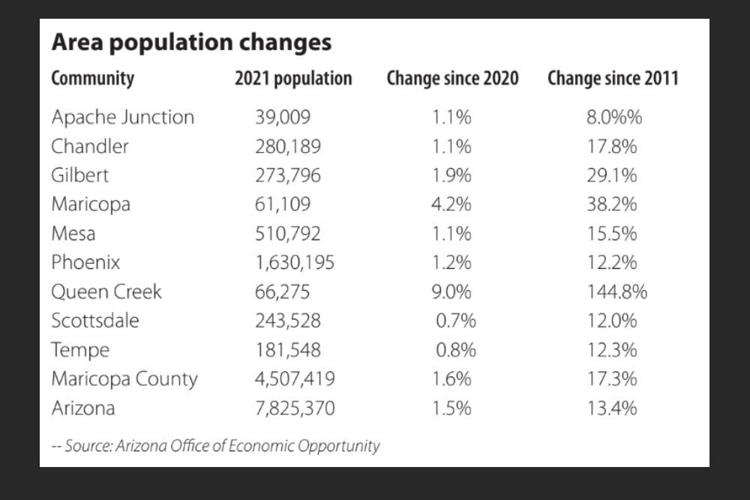Mesa saw few newcomers last year, state says
". . .Although Mesa’s population grew by 15.5% between 2011 and 2021, that increase lagged behind some of its neighbors – notably Gilbert, Chandler and Queen Creek.
All three municipalities had greater population gains percentage-wise than Mesa – with Queen Creek posting a stunning 144.8% increase in that 10-year period and 9% last year.
The figures show the state’s population grew at a rate of 1.5% between June 30, 2020 and a year later. That’s how the agency tracks annual growth.
And the more than 860,000 new residents in the past decade amounted to a 13.4% increase.
Newcomers were picky and choosy about where in the state they decided to live.
So where did a lot of them go?
Think about areas near the state’s major population center, but far enough away to have houses that are affordable.
And since growth for Phoenix to the immediate south is blocked by the Gila River Indian Community, that left Pinal County communities of Coolidge and Eloy at 7.1% and 5.3% respectively.
The desire for affordable homes also boosted the population of Casa Grande by 4.3% and Maricopa by 4.2%.
Florence probably should have been in that list somewhere.
But the official tally shows that community actually lost close to 1,600 residents over a 12-month period, making it the community with the greatest percentage loss at 6.2%.
What’s behind that, though, has
little to do with the desirability of the community.
Jim Quang, the state demographer, said it has to do largely with the fact there are fewer people in the custody of the state Department of Corrections there.
Population in the Eyeman and Florence units went from 9,031 in June of 2020 to 7,796 a year later. And the trend continues, with the most recent inmate count at the two facilities now below 7,500.
Anchor cities are growing slower than the rest of the state.
Phoenix added about 19,000 residents, but only enough to post a 1.2% year-over-year increase. Land-locked Tempe – like Scottsdale – was pretty much where it was a year earlier.
At the other end of the Valley, Glendale added just under 1,900 residents, a 0.7% increase. But nearby Peoria, stretching much further out and with room to grow, managed to post a 1.9% growth rate, increasing to 3.8% for even farther out Surprise.
Pima County lags not just Maricopa County but the statewide average. And the key according to George Hammond of the Eller College of Business at the University of Arizona is how the economy is built.
“Tucson is just a less dynamic economy,’’ he said, heavily reliant on jobs in federal, state and local government. “We just have a lot more of that. And it’s just not a growth industry.’’
There is a plus side to all that. Hammond said it tends to make the economy less susceptible to wild swings.
But he also said that geography plays a role in economic development.
Hammond said as firms look to locate or expand in Arizona, the Phoenix area is “just more of a draw,’’ with things like much better airport connections. . .



No comments:
Post a Comment